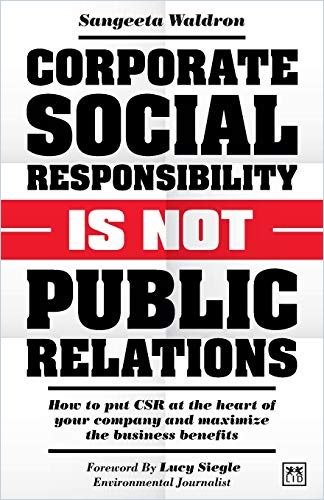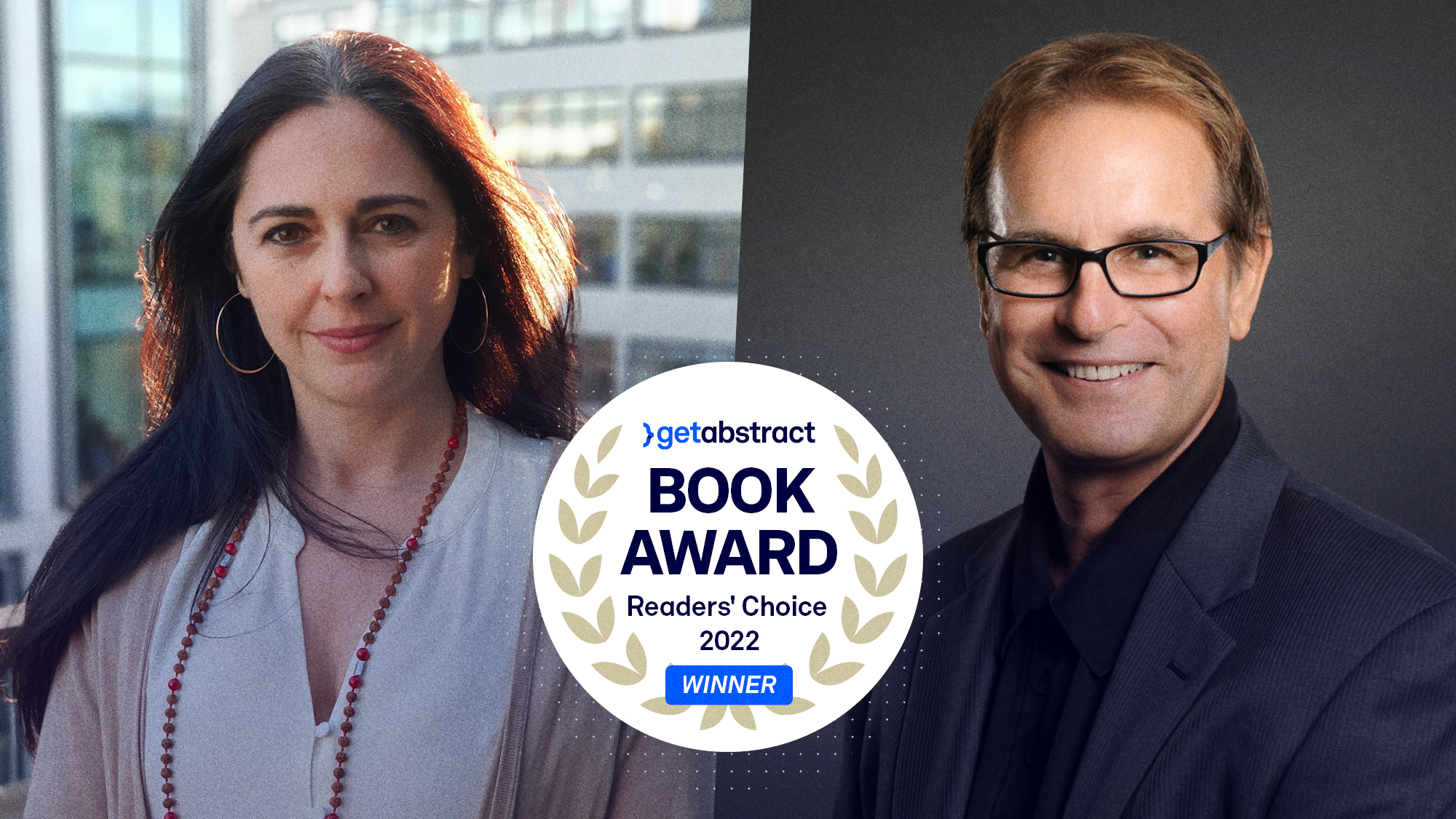“CSR Must Be Related to the Passion and the Purpose of the Company.”

Not only are today’s consumers looking for more ethical choices in the products and services they buy, but job seekers and investors alike want to know their commitment of time or money to a company is, even in a small way, doing some good. In Corporate Social Responsibility Is Not Public Relations, author Sangeeta Waldron argues that making the world a better place is something people increasingly look to companies to do.
First of all, what is social responsibility and how is it different from public relations?
Sangeeta Waldron: The two are very different. Corporate social responsibility (CSR) is all about the purpose of a company, the ethics. It includes things like how a company treats its employees and its customers. CSR is about having authentic values and is at the heart of a brand and, should be at the heart of its business strategy. Public relations (PR) is a completely different ballgame altogether. It’s about promoting a brand with the media. It’s about raising brand awareness. It’s about marketing. There is a clear distinction between the two. Public relations does not lead to corporate social responsibility. When you lead with PR instead of CSR, there is the danger of it being greenwashing, and being a tick-boxing exercise. There isn’t a real understanding of the brand or its values. But, when you lead with CSR, the brand speaks for itself.
I’m also finding those companies who are operating with CSR at the heart of their brand don’t have to really work on their PR because customers are naturally talking about them and referring the brand to others.
Sangeeta Waldron
How has the COVID-19 pandemic changed the way people and companies think about CSR?
This has been devastating for all of us, and it’s not yet over. It’s touched us all in different ways. But, if there’s something positive in all this, it’s that the pandemic really accelerated this understanding about corporate social responsibility. We are seeing more and more brands wanting to put CSR at the heart of their business strategy. We’re seeing more and more brands, whether new or established, wanting to make that transition to being CSR and purpose-led. There’s lots of data coming out to prove this. Every other day, we’re seeing data and research coming out to show how consumers and how employees want brands to operate. And brands are listening.

There’s a really good survey I always like to quote, which came out in 2020, call the Zeno Strength of Purpose study. They surveyed eight markets – US, UK, Canada, France, India, China, Singapore and Malaysia – and 8,000 people. Seventy-five percent of respondents said if they felt a company was greenwashing, they would vote with their wallet and go elsewhere. They wouldn’t give that brand a second chance. And 76% of respondents said they wanted to see CEOs walk their talk, to really embody the brand and the business. We’ve also seen this during the early stages of the COVID-19 pandemic, where certain brands have actually performed better than certain governments in delivering relief to frontline health and care workers. In Paris, we had some of the luxury brands like Prada pivot, and instead of producing couture, produce and deliver hand sanitizer to frontline workers. We’ve seen this change across different regions, in different countries. The pandemic has really accelerated CSR.
What is the “triple bottom line” and how does it affect a company’s prospects for investors?
The “triple bottom line” has been around for a long time now. It means “people, planet, profit.” All these three things work in unison together. You don’t put one before the other. Research shows more and more investors are looking to invest in companies that have strong CSR values. The reason is very simple: because they’re low risk. There’s less chance of those companies needing crisis management and they perform better. They have loyal customers, they retain staff, they are attracting new talent. All this makes for profit and are all good returns on investment, all good KPIs – which are all those corporate buzzwords that we like to say; these are all things that investors are looking for.
You say in your book that CSR is especially important to younger people – is this influencing where they work as much as what they want to buy?
Oh, absolutely. And again, data is showing that. The next generation want to make a difference. They don’t want to work for organizations that are not doing right by the planet. It’s that simple. They really want to work with brands and businesses that have purpose, that they feel good about. They then give their loyalty. They stay. Companies are also attracting the best talent that way. In the book, I did an interview with Mark Holden from Holden and Partners, a company that advises individuals and companies how to invest their money sustainably. He says the next generation is also really pressuring their parents and grandparents to invest ethically. So, you know, they’re doing it from all angles. And just very quickly on that, I was at COP26 (the UN’s 2021 Climate Summit in Glasgow) and these are some of the conversations that were happening there. We’ve had the conscious consumer for some time now and we’re aware of the conscious consumer.
Now we have the rise of the conscious employee, the conscious CEO, and what we also now call the conscious activist.
Sangeeta Waldron
Do you foresee activist investors for climate crisis as millennials and generation Z get more economic strength?
Yes, that’s happening already. For example, while India has the second-largest population in the world, it also has the highest number of social entrepreneurs in the world, who really want to make a positive difference. This next generation wants better. It makes sense.
Oh yes, it certainly does. Can you give some examples of ways that strong CSR programs help with hiring?
When you have strong CSR values, they should be across everything you’re doing – on your website, in your hiring packs, in your introduction packs – so employees can see what you’re doing. But also, when you are hiring, the recruitment agencies and your HR team all are aware of the ethos of the company. And it is also very clear to any prospective people that you’re interviewing, as that’s what people are looking for. We’re also seeing this shift, where we have more people working from home. And now, when things have started up again, we have had the “great resignation,” where many people are resigning from their current companies, because they’re reassessing their values, reassessing their lives. So, this all fits together.
Corporate social responsibility isn’t solely about the climate crisis. It’s about our well-being and our purpose. All these aspects are important to us.
Sangeeta Waldron
Do you find that younger founders think more easily about incorporating CSR? It sounds like they are and even maybe why many are getting into business.
Yes and some of them are far more switched on about CSR, as they’re reading a lot and they’re watching a lot of images about what’s happening to the planet. You know, maybe there was a time where, wherever we were in the world, we thought maybe climate change was happening somewhere else to someone else. But now we know it’s not over there, it’s on our doorstep. We can’t hide our heads in the sand. Yes, younger people are far more aware of what’s going on, and they want to make change. I think that’s their driving force.
They’re realizing profits don’t mean much if you can’t enjoy your life or there’s no air to breathe.
And also, companies are realizing the planet’s resources are limited. So, if you just keep plundering, you’re not going to have anything else to produce at some point. You know, we’re the only species that doesn’t work in harmony with nature. Everything else works in harmony. We’re the only species, with all our intelligence, that just exploits. We exploit each other. We exploit nature. We don’t have a balance.
In your book, you mentioned a 2015 survey that discovered 90% of consumers worldwide looked to companies to help solve big social and environmental problems. Can you give an example of one or two corporations that have embraced CSR and done a great job and are making a difference, but also how CSR is good for their business?
Yes, there are quite a few. One is Ben & Jerry’s. I think that’s a really good example. It’s one everyone knows. They practice what they preach and they’re giving back to the planet. They’re also doing good by their workforce. Another one, also an international brand, is Lego. Lego’s doing lots of great things. Lego pieces are sustainable; they’re making the pieces out of sugarcane. Also, Lego recently announced that, because they’ve made so much profit, they’re giving their employees extra paid time off and they thanked their workforce for all their efforts and everything they’ve done. Those two are great examples. Then here, in the UK, we have a department store called Selfridges, which is in different parts of the country. Selfridges is about luxury brands and high-end shopping, but they created a pop-up within the women’s fashion retail where you can buy secondhand preloved clothes, which is unusual for a department store. Selfridges has helped to make secondhand more mainstream. I think that’s just a brilliant way of bringing it home to all of us.
That’s great. It’s a good strategy in line with creating a more circular economy. Do you find a lot of greenwashing in CSR? How can consumers learn more about what’s the truth and what’s not the truth?
Yes, sadly it still goes on, and it goes on in different guises. In France, they actually made a law where companies that are greenwashing through their adverts will be fined for doing so. This is a step in the right direction. Here in the UK, we’re going to be doing the same thing. How do consumers find out? It’s a minefield, but people need to keep asking shops, brands, businesses about their CSR. Look on a company’s website, see what they’re doing. Do they have CSR? Do they say they are working ethically for the planet? Companies that are doing so will have those statements, but even then, we know some of those reports are pure greenwash, so it’s not easy for the consumer.
I think the only way we can keep challenging companies is to keep asking them. Hopefully it will change bad behavior.
Sangeeta Waldron
Do any examples stand out for you of half-hearted CSR initiatives that then backfired?
Sadly, yes. There’s Burger King. Here in the UK, we’ve had this awakening about plant-based diets, and we have what we call Vegan Mondays. People are really buying plant-based food, and Burger King thought they’d ride on this and started to sell vegan burgers, which is great. But they were cooking the vegan burgers alongside all the meat burgers. So, it wasn’t reflecting the whole ethos, it was a tick-box exercise. There were riding on the wave of something. Again, looking at fast food, McDonald’s in the UK decided to replace their plastic straw with a paper straw, but the paper straw could not be recycled.
When companies don’t think it through, they’re going to face backlash. And that spreads very quickly in this internet age. Companies are finding they can be cancelled while they’re asleep. They wake up and find headlines all over the world. It just shows how connected we all are.
Sangeeta Waldron
Yes, it does. So, would you say CSR is just for big companies?
Oh, absolutely not! That’s the whole purpose of my book – CSR is for all types of businesses, including small companies, new companies and start-ups to think about corporate social responsibility. This is also something that came out of COP26, where there are many new initiatives to help get small businesses get on board with CSR. CSR is not just for the big players. If small companies just start with one thing, but do that one thing well – that’s all you need. If you’re a retailer on the high street, look at your supply chain, see what you’re selling. Or if you’re a small manufacturing business, look at your supply chain. Look at who you’re collaborating with, do they hold the same values? It’s very simple. Also, small companies are located in communities, probably employing people from the local area. If you’re a small brand, think about your relationship with the community you’re operating in. It all comes down to the little things, that maybe before you didn’t really put a lot of attention on, but now there’s no excuse. Now we all must be thinking about our impact.
So, what are some questions companies can ask themselves to find the right initiatives for them? And what’s the best way to go about building some consensus about that within?
The consensus always has to come from the top. You can’t just bolt CSR on. It can’t come from Human Resources. It can’t come from PR, or the Commerce Department, or from the IT department. It has to come from the very top and be driven by the CEO, who needs to put CSR at the heart of the business. And that way it filters out and it permeates into the company. It can’t be delegated.
You often write about “business with heart.” That seems to be the way you think about business and as sort of a living, contributing part of their communities, no matter how big or how small.
Because I think that’s true. Everything has a heartbeat. Everything has a pulse. When we think that way, we can move things far quicker than if we just see it as something that doesn’t have that sort of living connection. I do really believe that. A lot of this thinking comes from India. I think in the West, sometimes we don’t really give the East a lot of credit and we think we can teach the East. But in fact, the East can teach us a lot too in return.
Absolutely. So what kind of questions should CEOs ask themselves to find the right initiatives for them?
Start by asking what’s their purpose? What’s the business there for? If you are manufacturing cars, how are you operating? How are you looking after the well-being of your staff, can you reduce your carbon footprint? Can you have a better impact on the local community where you are operating? It’s those questions that the CEO needs to think about and ask. There might be many things that a large organization might think it wants to deliver on from a CSR perspective, but if it focuses on, maybe, four and get those four right, then it can expand onto others.
Sometimes we make things really complicated, the answer is just to ask ourselves simple questions: What’s the purpose? What’s the passion?
Sangeeta Waldron
It has to be relevant. When we have passion, we deliver far more quickly. We engage everyone. So, I think it’s just those two “Ps.” What’s the passion? What’s the purpose? And then, also, how do you want to do right by the planet? So maybe it’s three “Ps,” which goes back to “people, planet and profit.”
Before we finish up, I’d like to ask for your insights from COP26 as they bear on corporate social responsibility.
An underlying message at both the World Leaders Summit and the fringe meetings is that private corporations and businesses have a really important part to play in moving the needle on climate change. Prince Charles said that private corporations needed to work alongside governments all over the world to help shift the needle on climate change because quite frankly, some of these companies are far richer than lots of nations, and have the resources to invest in new technologies and renewable energies. They need to be playing their part, as governments can’t do this alone. Within that, it is not just the big players, but also the small businesses who have a very important role to play.
About the Author
Sangeeta Waldron is an award-winning public relations professional and founder of Serendipity PR & Media in the UK. Along with Corporate Social Responsibility is Not Public Relations, she is the author of The PR Knowledge Book.





